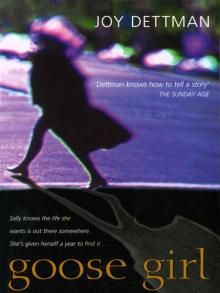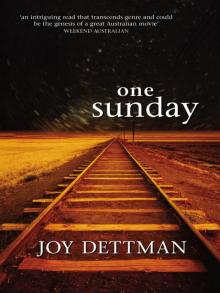- Home
- Joy Dettman
Thorn on the Rose Page 20
Thorn on the Rose Read online
Page 20
‘It’s such a terrible, terrible pity,’ Miss Blunt said.
Margaret had of course heard the gossip — this town was a hotbed of gossip — it was up to the individual as to how much she chose to believe.
This morning Margaret believed. She forgot about the skein of wool and followed the pram back to North Street. It continued over the road and on down Blunt’s Road, which intersected with Hooper Street at the school end of town. Margaret followed it until it crossed over Hooper Street, then with no good reason to follow further, she stood on the corner watching until girl and pram turned left into King Street and were lost to her view.
But not if she moved quickly. She scuttled for home.
Now in her thirties, she had all but accepted her spinsterhood, her childless destiny; today she knew she was an aunt. Why else had Jim given that girl his pram? And look at the girl’s reaction to her queries about the pram. In the letter Jim had written to his father the day he’d join the army, he’d as much as said . . . Of course she was an aunt, and by the look of that infant, had been an aunt for some time.
She stood with the rosebushes, neglected, overgrown, but offering good cover to those who did not wish to be seen spying. She stood unmoving until the pram was out of sight, convinced that God had sent that hornet so she might have reason to hold her nephew. Her own sweet nephew. And when would she ever hold him again? Never — unless she took matters into her own hands.
She had done her fair share of weeping this past year. She’d wept when the Japs bombed Darwin, when ships were torpedoed and lives were lost, when her father roared. She wept when she remembered the balls she had attended with Sissy, when she thought of her gentle brother, a gun now in his hand. A weeping sort of girl, Margaret. She wept that afternoon while preparing the evening meal, wept when saucepan lids slipped through her fingers and rattled to the floor. Her father and Lorna did not venture out to the kitchen to ask why she was weeping. When one of the better dinner plates skidded from the table, no one came to help her sweep up shattered china. She wept over the broken shards. No one noticed.
They noticed she’d forgotten to put salt in the potatoes, that the peas were a little underdone, but they cleared their plates.
Margaret had no appetite. She chased green peas with her fork while Vern spoke of an offer he’d had for Monk’s section of the farm. The money spent on restoring that house was a burr in his underwear. Lorna spoke of the new bank manager’s dogs, a burr in her own — they barked at her each time she walked by.
Two of a kind, Vern and Lorna. They sat at opposite ends of the table, discussing the town, the war, the fools in town and out of town, while Margaret dreamed fine dreams of raising Jim’s son in Monk’s house, her fork chasing, catching peas, placing them individually into her mouth. And yes, they were a little underdone.
The family dormouse, Margaret. She nibbled; she ran from danger; she scuttled into corners, scratched among old papers.
Vern had a box of old papers, his own, his father’s and his grandfather’s marriage lines, birth certificates, land deeds. She knew that Lorna Langdon, Vern’s first wife, had been seven years Vern’s senior, that for near ten years their marriage had not been fruitful. She knew from the death certificate that Lorna’s birth had killed her mother. It was all documented. Vern had been a widower for two years before he’d wed Rita Jones, Margaret’s mother, a girl of eighteen, who had produced Margaret less than seven months after the wedding.
The knowledge that she had been conceived out of wedlock had at first shocked then excited Margaret. At one stage, when courting Arthur Hogan, she had been sorely tempted to . . . to give in to his urging. Had she, she may now have been raising her own little Arthur. Maisy’s daughter had not been so moral; her firstborn arrived six months after the wedding, a white-headed, purple-eyed female. And she’d produced another since.
Margaret had three green peas corralled between neatly cut carrot and overdone chop. She invariably placed the worst cuts of meat on her own plate, the burned chops, the broken eggs. A tear escaped, blurring the burned chop, magnifying the peas. Stabbed one, carried it to her mouth, and thought of her mother, who had also served herself the worst cuts.
She’d known her for only nine years, happy years on the farm. Then her mother had died and Vern had sent both girls away to a boarding school. Barely six months later he’d wed Joanne Nicholas.
Never, never would Margaret forget the day she’d first set foot in Joanne’s fine house, nor would she forget the first time her new brother had been placed in her arms. Today, she’d held his son.
To bear a child, to love and be loved by that child, was every woman’s right, but in order to have that right a woman must first give herself to a man. After Arthur had been stolen away, there had not been another. The cruelty of life; a woman’s content or discontent dictated by the whims of man. Life was unfair.
A tear dripped and Margaret blinked, glanced at Lorna, already tapping her talon nails on the cloth, waiting for dessert.
She ate like a horse — a horse with worms. Never an ounce of fat did she put on her bones. Margaret ate like a bird and each year her waist expanded. Wrongly born a female, Lorna never mourned for her children unborn. Tonight Margaret mourned — and she envied that Morrison girl. Three babies. Three, and what was she, seventeen, eighteen?
The tear fell to her burned chop.
No one saw it, or noticed when she rose and carried her untouched meal to the kitchen, where a steamed pudding rattled too merrily in the steamer. No one came to comfort her when the steam burned her wrist. She must control her emotions. She must focus her mind on her tasks. Her tasks — and why hers alone? She had become Vern’s kitchen maid, as her mother had been his kitchen maid.
The kitchen maid served their dessert, steamed chocolate pudding and custard. She sat with them, listened to them, until both mouths were full. Hers was not, and she opened it.
‘Were you aware, Father, that Jim gave his old pram to the Morrison girl?’ Vern turned to her. ‘I recognised it today.’
‘They should be taken away from the little slut,’ Lorna said.
Margaret’s mouth opened, closed. She blinked, her head denying the words she was about to say, but God had a plan for her and tonight he would not allow her silence.
‘The boy is Jim’s, Father, and such a sweet mite.’
Vern froze. Lorna singed her sister with a glance. But a dormouse becomes good at dodging, and must take chances in order to snatch the cheese.
‘I held him today, at Blunt’s.’
Vern, who didn’t rise easily, rose, his good hand on the table, his bad hand raised for silence.
Margaret did not fall silent. She reached for her father’s hand. ‘I believe he has the thumbs, Father. His hands are so like yours.’
Vern shook her off. He got out, out to his chair on the western verandah — and he forgot to take his walking stick.
‘Are you attempting to give him another stroke?’ Lorna said.
Margaret spooned up her chocolate pudding. ‘I held him, Lorna. I held him, and he knew I was his aunt. You are an aunt. Jim has a son.’
Lorna left the table. Margaret sat on alone with the dirty plates. They’d remain on this table until she cleared them, washed them, dried, then put them away. She had help in the house on one morning a week. She did the rest, washed the linen in an electric laundering machine, sucked dust from the carpets with a vacuum cleaner. She managed.
And she’d manage that babe, too. That girl had three and would no doubt have more. No court in the land would deny a grandfather’s claim. However, she must first convince the grandfather.
She gave him an hour, by the clock, then made tea and cut a piece of her specialty, her ginger fluff sponge. Lorna was at the writing desk. She took care of the accounts for mill and farm. Margaret took her a tray, needing her to stay where she was. She took a second tray out to the verandah where Vern sat watching the road. He thanked her. She stepped back but didn’t leave, ag
ain waiting until his mouth was full.
‘If you saw him, it would be as obvious to you as it was to me, Father. He is Jim all over.’
‘Enough,’ he said.
‘He gave her his old pram.’
‘Are you deaf, girl?’ Vern roared.
A dormouse has excellent hearing. She scuttled back to her kitchen to nibble on cake. Her features, and at times her demeanour, were that of a mouse — a mouse overindulged. She was a younger sister who had never learnt to fight back, the middle child, lost between the first dominant daughter and the only son. She’d spent her life invisible, had grown accustomed to scuttling for cover when the old lion roared. She feared his roar. She did not fear her sister.
Lorna came with her plate for a second slice of sponge. Like her father, she was moderately appreciative of her sister’s kitchen skills.
‘We could raise him out at Monk’s, Lorna. And if it was to become known that Jim has a son, he may be released from the army.’
Lorna scorched her with that raised eyebrow and returned with her cake to her bookkeeping.
Margaret was not an avid reader; mathematics had plagued her in the schoolroom. She knew nothing about the keeping of books, but a mouse, in its own quiet way, in its own element, is smart enough.
Each week she wrote long newsy letters to her brother. On occasions Lorna penned him a line or two. The only time Vern picked up a pen was to sign cheques, written by Lorna. Jim wrote every week or so, his letters addressed to his father. He’d made no mention of an illegitimate son — though of course he would not mention it to his father.
To her perhaps. She’d write to him tonight. She’d tell him she’d recognised his old pram . . .
Or perhaps not tonight.
Out to the verandah again. ‘Such a pleasant evening,’ she said.
‘Have you got any more of that cake?’ Vern asked.
She brought him a plate then sat with him to enjoy the pleasant evening. Dark now, the nights were drawing in, winter on its way again, but far away tonight.
‘Perhaps there is rain on the breeze,’ she said.
‘Could be. It’s warm enough.’
Crickets chirping, autumn leaves stirring like the pages of a dry old book. She waited until the moment felt right.
‘We cannot allow it, Father.’
‘Don’t you open your mouth.’
‘We cannot allow your grandson to be raised by a . . . in that black’s camp.’
‘Goddamn you,’ he roared and cake crumbs flew. She wiped one from her eye, reached over to wipe his mouth with a serviette. He swiped at her wiping hand. She backed away but would not back down.
‘If you saw him, you would recognise him. With a dependent child, Jim may be able to get out of the army.’
‘Get out of my sight with your manipulating, you blathering bitch of a girl. Get!’ He got up from that chair faster than he’d risen from it in months and limped down to look at his neglected roses. They were done with blooming for this year, and the way his blood pressure felt tonight, he doubted he’d see their next blooming.
‘Bloody fool of a boy. Bloody book-reading simpleton. A man got himself surrounded by a bunch of feeble-minded bloody half-witted —’
A week passed and not a word did Margaret speak of the child. Midway through the second week, Vern came on her leafing through a photograph album. Few can resist an album. He glanced over her shoulder at a shot of the infant Jim, lying on a blanket. His hand moved to halt her progress at the page displaying a two-year-old Jim, his hair still long and girlish, hiding his ears. Vern remembered it well. He’d argued with Joanne over that photograph, had told her to stop turning his boy into a girl, that he already had two of them, and when he couldn’t convince her, he’d carried his boy to the barber and had him clipped to the ears and he’d paid for it when he returned a goblin to his mother.
Pages turned. Lorna’s mother, a plain woman, horse-faced, narrow-hipped. No photograph of Margaret’s mother, nor of Margaret until she was nine years old. Her mother dead, she had emerged from the wilderness, a worried, saucer-eyed girl, seated on a cane chair, holding baby Jim.
Margaret’s hand prevented him turning the page. ‘That’s the one I was looking for,’ she said. ‘I knew it was in here somewhere.’
‘He was four months old,’ Vern said.
‘Jim’s boy would be around the same age. It could be him, Father.’
‘Are you trying to break a man’s heart?’
‘What chance has he got if we leave him to grow up out there?’
‘It’s young Darkie Hall’s. She’s spent half her life hanging around him.’
‘I kissed his little hand. It’s a replica of your own and Jim’s. He grasped my nose with it. He’s your grandson, my nephew, and I want to raise him, Father — out at Monk’s.’
Vern turned the pages back to a photograph of himself, holding his long-haired two-year-old. Just a young man then, strong in the leg, strong in the mind, he’d thought he’d live forever.
‘Put the bloody thing away,’ he said. ‘Put it away and leave it away.’
She put the album away.
But a mouse is a rodent and rodents have a bad habit of gnawing. Margaret gnawed during the following weeks. She altered her angle and gnawed, then on a Saturday evening, having claimed a headache, she sent Lorna off to the movies alone. At eight o’clock, in the kitchen, the cake tin between them, she moved in for the kill.
‘I spoke to Mrs Foote at the grocer’s yesterday. Jimmy was born a month early and he weighed nine pound eight ounces at birth. She says he has . . . has the thumbs.’
A mouse can undermine a wall if given time.
CLOSED DOORS AND BIRTHDAYS
Vern woke feeling old on his birthday, woke up wanting to be young and sitting again in Gertrude’s kitchen, his life ahead, not behind him.
Lorna presented him with a large atlas, which he’d paid too much for and didn’t want. Margaret offered a cardigan, which he also didn’t want. Old men wore cardigans, though maybe not of that shade of blue.
‘You’ll be crocheting me a knee rug next.’
‘You can button it like a sweater or leave it open, dear,’ Margaret said.
He tried it on. It was warm. It buttoned across his belly. It felt comfortable. He left it on.
At ten, when the girls emerged from their rooms dressed for church, Vern was waiting in the hall, car keys in hand.
‘You can’t wear that thing to church,’ Lorna said.
‘I’m going down to have a look at that boy,’ he said. ‘Don’t wait lunch for me.’
‘I’ll come with you,’ Margaret said, church forgotten.
They came in force to Gertrude’s kitchen that Sunday morning. They filled it: Lorna, tall and ungainly; Vern, all height, belly and electric blue cardigan; Margaret, her ample chest heaving, her eyes watering. It may have gone better had Vern driven down alone.
The infant, kicking long legs in his father’s pram, crowed at his visitors. Lorna picked up a foot, studied then dropped it. Vern went straight for the hands, in particular the tiny thumbs. Gertrude stood back, knowing what he’d find.
And he found those double-jointed thumbs. And a hammer fist slammed into his gut. He hadn’t expected to see them again, hadn’t expected that grasping little hand to grab onto his finger. Vern couldn’t get a breath; his vision blurred. That wild little slut had made him a grandfather. There was no doubting it.
He looked at Lorna, busy taking inventory of a kitchen she had not previously entered. He watched Margaret cooing at her nephew. He looked at Gertrude. She had her back turned to him.
It was his birthday and she hadn’t remembered. She hadn’t told him to sit down either, hadn’t offered him a cup of tea. If she’d given an inch, he might have given two. If she’d said happy birthday, he may not have said what he did.
‘I’ll take him off your hands. We’ll see that he’s raised decent.’
Jenny, who had been holding the two small girl
s behind the green curtain, released them. Georgie catapulted out to the kitchen where she dived into the thick of the Hoopers. She moved them away from the pram. Jenny wasn’t far behind her. She scooped Jimmy into her arms and was out the door, Georgie at her side.
The Hoopers followed them out to the yard. ‘You bring that boy back here,’ Vern demanded.
With eight or ten yards between them, Jenny turned. ‘I’ll raise him decent and without any interference from you.’
‘You couldn’t raise dogs,’ Lorna said.
‘You could teach them how to snarl,’ Jenny said, continuing on towards the goat paddock gate.
‘Get that boy back here,’ Vern roared. Jenny was on the far side of the gate. ‘You bring that boy back here now or I’ll have you in court next week, you hot-pants little bitch. I’ll have the lot of them taken away from you.’
‘You take me to court and I’ll tell everyone how Lenny knocked on your door to get help for me when your grandson was stuck inside me, and how your witch of a daughter threatened him with a bucket of dishwater.’
Vern had seen that kid fall into his rosebushes. He hadn’t known why he’d been there. Had he recognised him, had he known Gertrude had sent him —
‘You’re a contagious disease infecting every youth in this town,’ Lorna snarled.
‘Every man in Australia has been immunised against you,’ Jenny said.
‘Stop it,’ Gertrude said. ‘That little boy is no trophy to be fought over. Get over to Elsie’s, Jenny, and you take your girls home, Vern. I won’t have my land turned into a battlefield, not by you or anyone else.’ She went inside and closed her door.
Margaret, the instigator, stood in the yard, watching her nephew disappear into that nest of blacks. Lorna walked to the car, already preparing her case for court. She’d studied law at university, for a time.
Vern was staring at the house, at the closed door. Gertrude hadn’t shot that bolt, but he was outside and she was in, and he wanted to howl.
He’d pulled the tail off a lizard on his fourth birthday, just to show Trude how smart he was, and she’d run inside and slammed the door. Today he was that boy again, standing outside her door, the lizard wriggling in one hand the tail in the other.

 The Hope Flower
The Hope Flower Trails in the Dust
Trails in the Dust Diamonds in the Mud and Other Stories
Diamonds in the Mud and Other Stories Moth to the Flame
Moth to the Flame The Tying of Threads
The Tying of Threads Wind in the Wires
Wind in the Wires The Seventh Day
The Seventh Day Thorn on the Rose
Thorn on the Rose Jacaranda Blue
Jacaranda Blue Mallawindy
Mallawindy Ripples on a Pond
Ripples on a Pond Goose Girl
Goose Girl The Silent Inheritance
The Silent Inheritance Henry’s Daughter
Henry’s Daughter Yesterday's Dust
Yesterday's Dust Pearl in a Cage
Pearl in a Cage One Sunday
One Sunday